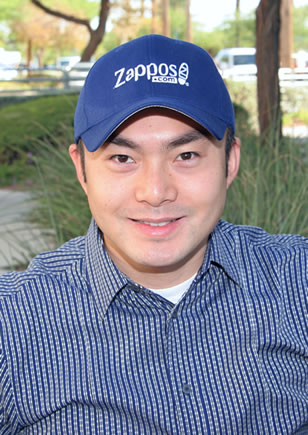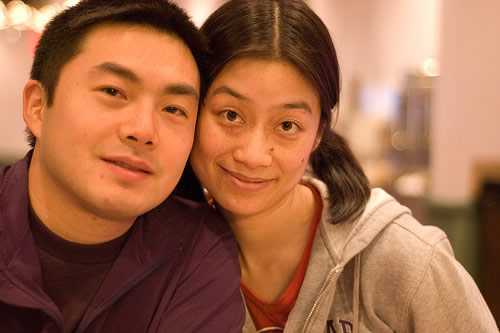
Alfred Lin from Zappos is with us for this interview. Alfred is the Zappos Chairman and COO – he’s Tony Hsieh, the CEO’s right hand man when it comes to handling finance and operations for Zappos. We’ve previously published an interview with Tony here.
I wanted to interview Alfred to get his perspective as being the key guy working with Tony. I wanted to understand how they met and how they’re building Zappos. Most successful technology companies were built by two guys working together (Google, HP, Microsoft, etc) and I thought this would be a good opportunity to understand this kind of relationship better.
I didn’t expect Alfred to focus so strongly on the importance of the entire team being strong, not just the Tony/Alfred relationship. In his mind they’re successful because of the entire team, not just the two guys in the spotlight.
On a side note, Alfred talks about how he and Tony Hsieh, the CEO of Zappos started working together. Tony sold pizza by the whole pie. Alfred sold pizza by the slice. Who do you think was the most profitable?
Full Interview Audio and Transcript
Personal Info
Hobbies and Interests: Running, has a goal to run a marathon in every state in the United States, going out to dinner with his wife.
Favourite Sports Teams: Since he grew up in NYC, all the New York teams.
Favourite books:
- Tribal Leadership by Dave Logan, John King, Halee Fischer-Wright
- Good to Great by Jim Collins
- Freakanomics by Steven D. Levitt and Stephen J. Dubner
Favourite Entrepreneurs: He tries to learn from all entrepreneurs.
Twitter url: http://twitter.com/zappos_alfred
Personal blog: http://blogs.zappos.com
Company website: www.zappos.com
Fast Track Interview
Adrian Bye: I am talking with Alfred Lin, who is the COO of Zappos. Alfred thanks for joining us. You want to tell us a little bit about who you are, your background and where you’ve come from?
Alfred Lin: Sure. As you mentioned, I’m currently COO of Zappos.com. We are one of the largest, if not the largest, retailer of shoes, handbags and apparel on the Internet. We really think of ourselves first and foremost as a service company, and then a service company that just happens to sell these products.
I was born in Taiwan and lived there until I was about six or seven. I was old enough to remember that I was not born in this country but not old enough to really get a good sense of where I lived. I was raised mostly in New York City, went to college in the Boston area and then came out to the Bay Area for graduate school. Over time, I got sucked into a bunch of Internet companies.
I first met our CEO, Tony Hsieh in college. He was running a pizza business in our dormitory. I used to go down to his pizzeria and buy lots of pies, take them upstairs and sell them by the slice. He made $2 or $3 an hour, and I made $2 or $3 in a minute, but he spent more time at it so he ended up making more money then I did.
After we left college, Tony came out to the Bay Area and started the company Link Exchange. I joined about a year later when he needed someone to look after the books and create financial models. I was an Applied Math major in college and in the process of getting a PhD in Statistics at the time. I agreed to work part-time as the VP of Finance & Administration while going to classes part-time. Gradually I got sucked in and believed in the business of Link Exchange. As a result I started to do less school and more full-time work.
Seventeen months after I joined, we sold the company to Microsoft for $265 million. Through Link Exchange, Tony and I discovered that we worked well together. After Microsoft bought the company, we started Venture Frogs where we raised a small fund from friends and family of Link Exchange; we used it to start investing in a bunch of Internet start-ups.
Zappos happens to be one of our investments. Over time, both Tony and I ended up thinking that it had the most opportunity, and it was also the most fun to work at. Now, both of us are at Zappos.
Adrian Bye: A lot of success stories in Silicon Valley and elsewhere were started by two guys. Hewlett-Packard. Apple. Microsoft. Oracle. Google. There’s just a balance between two guys, and you’re the key guy with Tony now. I find that absolutely fascinating. How did it evolve into becoming where you’re at now?
 Alfred Lin: If we get back to some of the things that we’re really interested in, in terms of creating culture, one of the books we’ve read recently, Tribal Leadership, proposes that three people together works a lot better. It’s a triad, and we actually do abide by that because we have Tony, Fred Mossler, and me who are basically the three guys that balance each other out at Zappos.
Alfred Lin: If we get back to some of the things that we’re really interested in, in terms of creating culture, one of the books we’ve read recently, Tribal Leadership, proposes that three people together works a lot better. It’s a triad, and we actually do abide by that because we have Tony, Fred Mossler, and me who are basically the three guys that balance each other out at Zappos.
I think there are people in the background who never really get the full credit even though they’re an important part of it. So you need a much deeper investigation into how organisations are formed and the level of their success.
At Zappos, all the ideas don’t come from me, Tony or Fred. They come from everyone in the company. The sign of a successful company is a group of people who decide that they’re going to leverage it, and maybe that’s really the key to its success as opposed to the two guys who come up with all the ideas.
Adrian Bye: What are some of the ways you could get leverage like that throughout the company?
Alfred Lin: When we talk to our employees at new hire orientation, we tell them that Tony, Fred and I are the three guys that appear to be on the top of the organisation. This company does not implement just our ideas. If our ideas get implemented and only our ideas, those are three good ideas in a day, a month or a year or whatever timeframe you think you come up with good ideas. If we leverage all 1,600 employees, then we’re going to get 1,600 good ideas that we can run with.
We tell everybody that if they’re passionate about something, they should just take ownership of it and run with it. This allows people to be accountable for things that they’re passionate about. We also tell them that if you’re passionate about something with 1,600 employees, I’m sure you can find 20 or 30 people who are also passionate about it.
Adrian Bye: Let’s say some guy that’s been in the company for a month has some great ideas that he’s really excited about. How does he run with those ideas?
Alfred Lin: It kind of runs along “I’m passionate about it, so let me do some things. Let me talk to more people about it.” People want to be part of winning teams so if it’s a good idea, it self-selects. People will want to be part of it and naturally it just builds upon itself. We have plenty of things that started out being crazy ideas that got built up over time and have become bigger things for Zappos. Culture is very important to us, and everyday we have minor tweaks that get built upon each other.
 For example, we started these parades. The first time someone wanted to create a parade and just parade through, it was kind of weird. It wasn’t well put together, but it got a few people to want a parade to say hi to people, throw candy at people and bring people’s spirits up. We thought that’s kind of cool in a way but kind of weird at the same time. These parades simply built upon themselves, and now people take them very seriously. There are themes behind each parade, and they really lift people’s spirits.
For example, we started these parades. The first time someone wanted to create a parade and just parade through, it was kind of weird. It wasn’t well put together, but it got a few people to want a parade to say hi to people, throw candy at people and bring people’s spirits up. We thought that’s kind of cool in a way but kind of weird at the same time. These parades simply built upon themselves, and now people take them very seriously. There are themes behind each parade, and they really lift people’s spirits.
We also decided we were going to take some tenant improvement money when we started moving into this space. Instead of getting it from the landlord and giving it to an architect or contractors to clean the space up and have a very sterile work environment, we asked if we could take the money and give it to some of our teams. We said to each individual team, “Go create a conference room the way you would like it created.” It didn’t cost us any money. The team loved doing it because they took a lot of pride and ownership in creating their own personal workspace. At the same time, it was a team-building experience for all of these teams. Now every single time we move into a new space, the standards get raised, and we give people a small budget of $500 to design each room.
Those are some of the ideas that we want people to run with and build into bigger things and bigger events.
Adrian Bye: Some people may look at that and say, “They can be a bunch of crazy kids running around, but someone’s going to get sued at some point. There’s going to be some sort of issue that’s going to come along, and a modern corporation just can’t work like that.” What’s your response to that?
Alfred Lin: That’s a very old-school, very risk-averse, and conservative viewpoint. In this day and age, everybody’s going to have a blog. Everybody’s going to express themselves in their own way, and people are actually less inclined to sue you if you let them express themselves in their own way and more inclined to sue you if you try to restrict them.
We have become a much more transparent society, especially the younger generation. There are things we, those of us who are not old but in our 30s and 40s, think are crazy, yet the younger generation has no problem telling people what they’re doing this weekend on Facebook or Twitter and just letting the world know this is who they are and what they’re like. You’re not going to be able to stop that. The level of transparency the company can provide and allow employees to express themselves is a key way for the company to have many more advocates for the company than just themselves.
Adrian Bye: When your layoffs happened, it was immediately reported real-time in Twitter. That’s about as transparent as you can get; that’s almost uncomfortable.
Alfred Lin: Yes, we really believe in being transparent and trying to make sure everybody knows what’s going on inside the company. Obviously, nobody likes talking about layoffs and doing layoffs, but we told the affected employees first. Then after that they started Twittering out. Immediately after those that were affected were told, Tony sent an e-mail to the whole company about our decision, why we did it and why we’re doing it in a proactive manner. Then he posted it on the company blog and Twittered it out.
The overwhelming response by affected employees, existing employees, and people who had been following Zappos was extremely positive relative to what most layoff announcements result in. Part of that is because we’re transparent. We really believe in trying to take care of people and to wow our employees, customers, partners and investors. We want to give all of them complete transparency.
Adrian Bye: Obviously the concept of wowing all of these different partners, employees and companies is a good and a nice one. At some level, you’ve got to be taking into account that you’ve got to negotiate with different people. You’re going to have a lot of people coming to you for different things all the time. You can’t do everything for everyone and you can’t be everything for everyone. Sometimes you do have to be able to step away and say no. How do you balance that and still feel like you’re giving people a wow experience?
 Alfred Lin: Wowing people is never about just spending more on them. A lot has to do with showing people that you care. For example even in areas that seem super-efficient, you can hire fewer well-trained people or train them less to do customer service.
Alfred Lin: Wowing people is never about just spending more on them. A lot has to do with showing people that you care. For example even in areas that seem super-efficient, you can hire fewer well-trained people or train them less to do customer service.
One example centers around scripts. It may be easier to train someone to read a script than it is to train someone to sound like they’re caring, but think about the consequences of whether you feel that the representative really cares about you or not. You can have policies and procedures read to you, and then another person who puts those in their own words and jokes with you on the phone. I’m sure you’re going to be wowed by the person who really cares, is providing you their undivided attention and is trying to connect with you versus someone who is reading a script. It really isn’t that much different. It’s just a level of expectation that we are real people and transparent.
Adrian Bye: What do your investors think about the culture of Zappos?
Alfred Lin: Mike Moritz from Sequoia Capital is on our board. They’ve invested in some companies that have been very successful; some of them with very funky cultures like Google, PayPal and Yahoo! They certainly believe culture is important, but they also care about financial results and driving results. As long as we do both, that’s great. It’s not just about the culture. You also have to perform your job, and we hold our employees to that standard too.
Adrian Bye: You obviously have done well, and that’s not an accident or a coincidence. How would you suggest someone start out today if they didn’t have the reputation or the resources that you have had as well as the opportunity to see inside multiple companies at once and go with the winner? How would you suggest they could build a company like Zappos?
Alfred Lin: First of all, figure out what you’re most passionate about. Tony talks about chasing the vision and not the money. It doesn’t matter how “successful” you are or whether people think you’re successful, business is hard, and you’re going to go through rough times and hard times.
We’re entering an economy where it’s going to be hard for everyone. But if you don’t love what you do, it gets really hard to get up in the morning and go in and try to fix problems each and every day. You really need to think about what kinds of things you would really love to do and be okay with not making money right away. You should find something that you love and want to do for the next 10 years without making $1.
That’s kind of a harsh way of looking at it, but think about it from the standpoint that if you start a company, at any point in time, you might have a bunch of success but business cycles are in 10-year increments. If it can survive 10 years and beyond then that’s a true test of whether a company is going to survive, not in the first year or the second year. Even though a lot of businesses fail in the first or second year, the time-tested battle is having to go through a business cycle. If you can’t go through that timeframe doing something you love and you are only chasing the money, then you run the risk of it not working out for you and you would have hated your life for the last 10 years. Who wants that?
Also, be open-minded by reading lots of articles or books about business. You can be open-minded by talking to lots of the entrepreneurs and hearing about what has made them successful. Try to incorporate that into your business. The joke I make fun of at Zappos is we don’t really have original or interesting ideas here. We just incorporate a whole bunch of ideas from all the people that we’ve met. We don’t copy things because copying them into your company doesn’t tend to work. You have to modify them. You take people’s ideas, modify them, make them better, and make them fit in your company.









